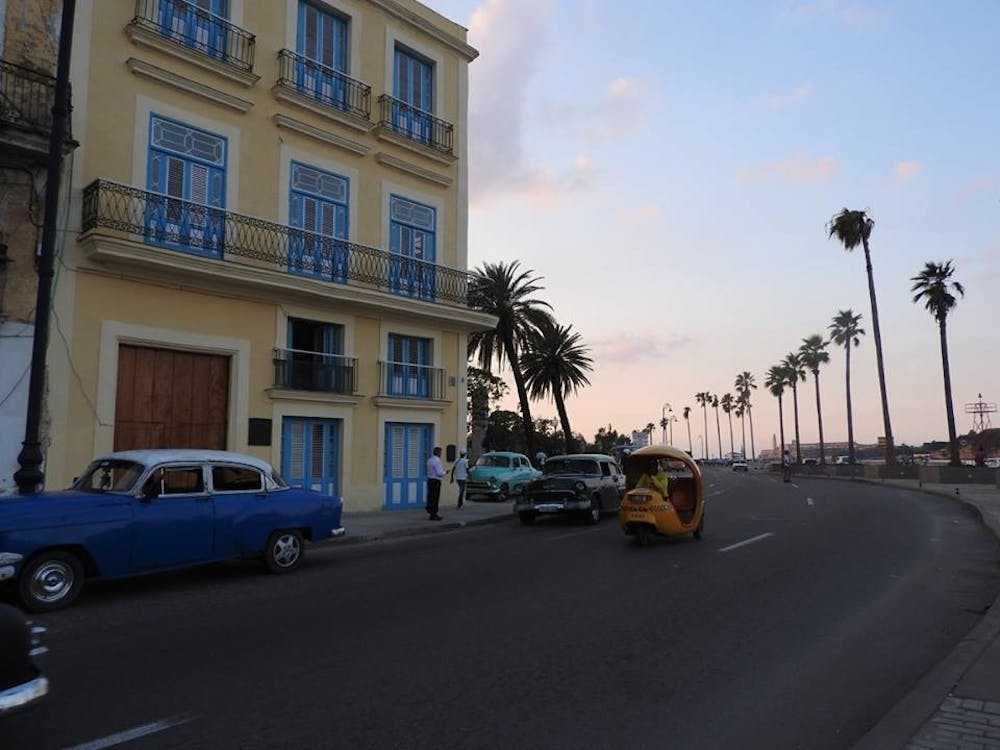Starting in the fall of 2017, University of Richmond students will have the opportunity to study abroad in Havana, Cuba -- a city that, until recently, was closed off to most American citizens.
The Office of International Education announced this month that it would be accepting applications to study abroad in Cuba during the fall 2017 semester through a new program hosted by the CIEE, a University of Richmond study abroad partner.
Patrick Schweiger, study abroad manager, said that the program has been a result of decades of initiatives to improve relationships with Cuba on behalf of university faculty, including a visit taken to Cuba by the international faculty seminar last year.
“Given this momentum toward Cuba and following strong engagement on the part of faculty in the Humanities, including Professor Mike Davison, the University of Richmond was selected by the Institute for International Education as a partner school for Cuba for the 2016-17 academic year,” Schweiger said in an email.
In order to engage deeper with Cuba and to motivate students to apply to the program, the CIEE is offering scholarships that cover the full cost of housing.
Students studying abroad in Cuba will take courses at the University of Havana and will have the opportunity to explore Havana and surrounding suburbs.
“Cuba has a wealth of beach, mountain, and city environments open for exploration,” Schweiger said. “Students on past trips to Cuba for jazz performance have noted the contrast in cities and the hospitality of the Cubans everywhere.”
Sophomore Alyssa Kiely, who is part of the SSIR “Salsa Meets Jazz,” was on the receiving end of Cuban hospitality when she visited the island with her SSIR in January.
“I think the touristy areas have begun to try and take advantage of the new tourists by overcharging for homemade items,” Kiely said. “Other than that, I felt pretty accepted by the Cubans.”
To some students, the program’s potential to be focused around tourist activities poses a problem with uncovering the authentic side of Cuba.
“I think tourism is not inherently bad as long as you know that you’re living in a touristy place,” said junior Sabrina Cabezas, whose mother is Cuban. “I would hope that it would be more authentic.”
Cuba’s touristic appeal has increased over the last few years, starting with the Obama administration’s efforts to begin a thawing process in the historically strained relationships between the U.S. and Cuba.
Enjoy what you're reading?
Signup for our newsletter
In July 2015, President Obama announced that the U.S. would reestablish diplomatic connections with Cuba. That same year, the Department of the Treasury’s Office of Foreign Assets Control (OFAC) began issuing travel licenses to Cuba for 12 general categories of travel, including educational activities such as the study abroad program.
“Academic exchanges are a particularly promising form of cooperation, as they have both short-term and long-term effects,” Stephen Long, professor of political science, said via email. “In the short term, institutions build new connections and begin to normalize interactions that were previously forbidden, but in the long-term, students who go abroad grow into adults who have a better understanding of the former rival's culture and worldview.”
According to the New York Times, President Obama eased restrictions on the importation of Cuban rum and cigars in October 2016 and petitioned to lift the Cold War trade embargo altogether, which thus far had prohibited trade of any sort with Cuba.
Although Congress refused to lift the embargo, Obama repealed the “wet foot, dry foot” immigration policy, which granted entry to Cuban immigrants who reached the U.S. via land, weeks before leaving office in the attempt to cement relations with Cuba.
“I think every president is doing the best they can do,” Cabezas said. “I think there has to be more of a leadership change in Cuba.”
While Cuba has not undergone significant leadership change, the U.S. certainly has. President Trump has said he is open to keep improving relations with Cuba, as long as Cuba concedes to more human rights reforms, among other things.
“I’m not pro-Trump, but I think that some of his foreign policy has been misconstrued, and if you look at the text of what he outlines, I think he reflects the ideals that both my mom and grandma want for Cuba,” Cabezas said.
Schweiger said that even if diplomatic relations were to change with Cuba, U.S. universities would most likely not be affected, as they have had relations with Cuba for decades. Any students studying abroad would have ample support from the CIEE, one of the largest study abroad service providers.
“Right now, I think there is a really good atmosphere, but I don’t know what Trump may bring,” said Rachel Tang, a sophomore who also visited Cuba with her SSIR. “Out of these past few years, this is the best time to go if you want to go.”
Contact contributor Sabrina Escobar at sabrina.escobarmiranda@richmond.edu
Support independent student media
You can make a tax-deductible donation by clicking the button below, which takes you to our secure PayPal account. The page is set up to receive contributions in whatever amount you designate. We look forward to using the money we raise to further our mission of providing honest and accurate information to students, faculty, staff, alumni and others in the general public.
Donate Now



